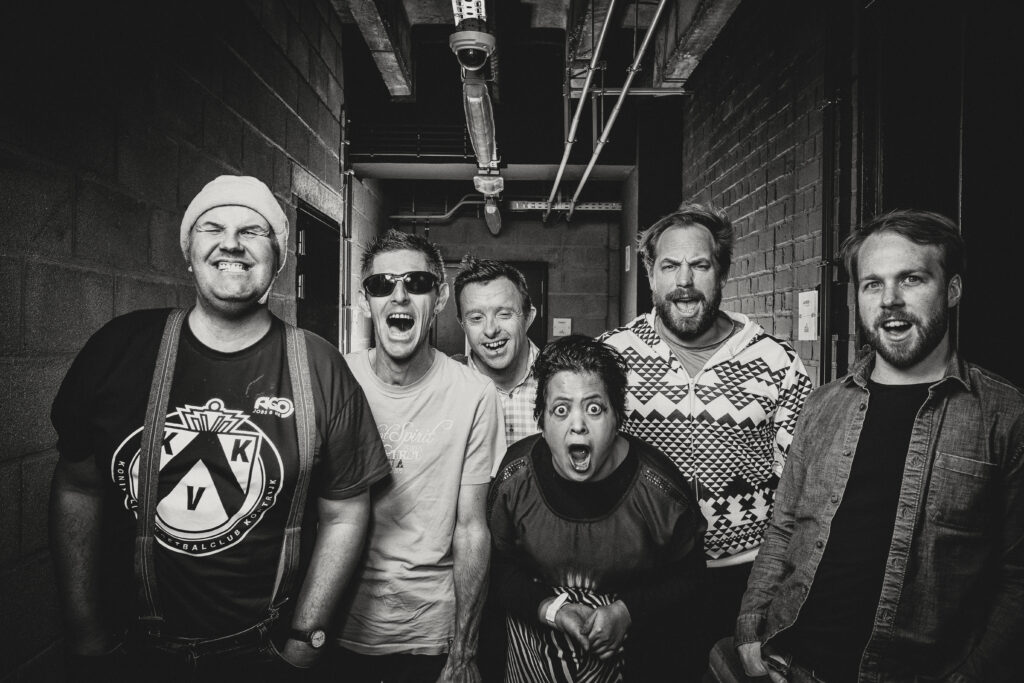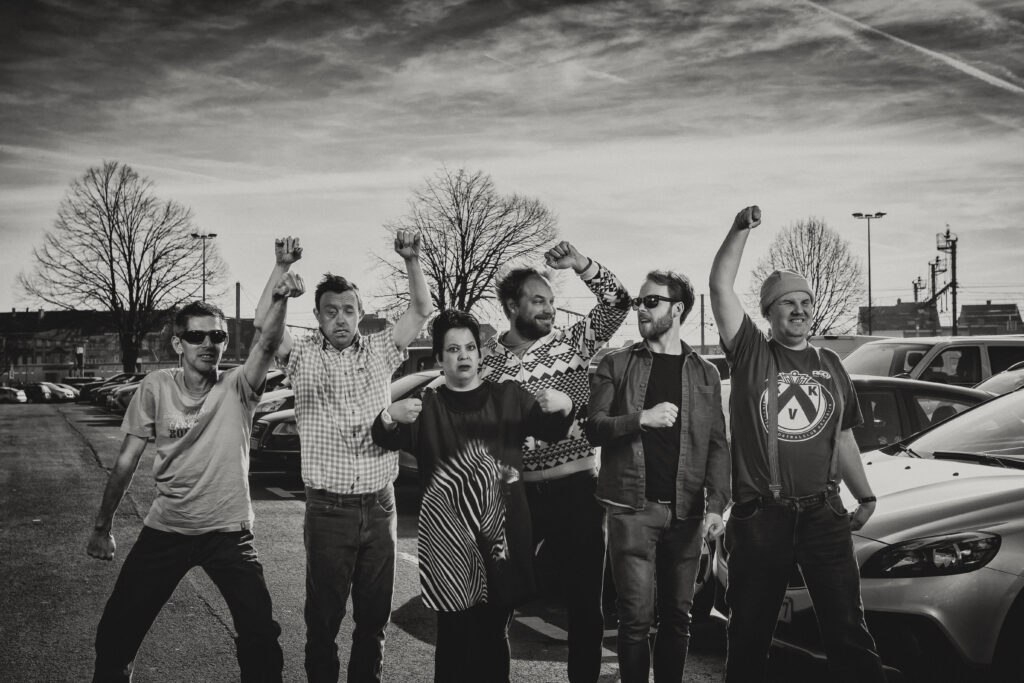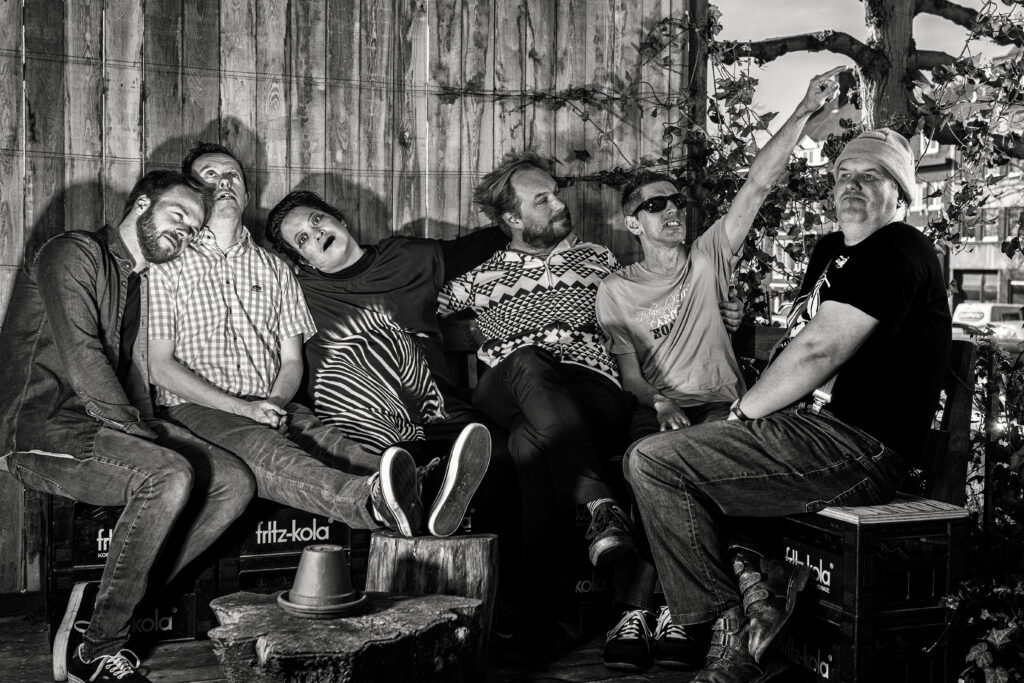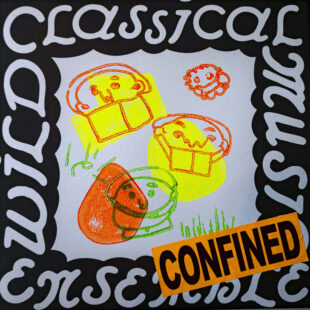 ENGLISH TEXT BELOW
ENGLISH TEXT BELOW
Le Wild Classical Music Ensemble est un groupe de rock expérimental belge composé de Sébastien Faidherbe (basse, chant), Johan Geenens (flûte numérique, chant), Nathan Copienne (synthé, chant), Nathan Ysebaert (guitare, chant) et Damien Magnette (batterie, sons et chant). Leur son unique est un mélange de riffs punk/rock, de rythmes fanatiques et d’envolées de flûte et synthé enflammés, par-dessus lesquels gravitent des chants à plusieurs voix et en plusieurs langues qui grattent rudement autant qu’ils réconfortent.
Tout démarre en 2007 à l’initiative de Wit.h (Courtrai) avec un atelier axé sur la musique expérimentale, Un an plus tard, c’est devenu un groupe, le Wild Classical Music Ensemble. Rapidement viennent les premières scènes, d’abord en Flandre. Leur premier album homonyme sort en 2012 chez Sub Rosa.
S’ensuivent plusieurs productions discographiques: Tapping Is Clapping en 2015 (Born Bad / Humpty Dumpty) ; Tout va bien se passer / Het komt Allemaal Wel Goed en 2019 (Born Bad). L’attention médiatique autour du groupe prend de l’ampleur, tandis que son aire s’élargit. Le Wild donne de nombreux concerts en France, en Suisse, en Espagne, en Allemagne, aux Pays-Bas…
Pour le happening artistique Blood Test (2019), Wit.h invite le guitariste Lee Ranaldo (Sonic Youth) qui expérimente à fond avec le groupe dans le cadre inspirant du studio du sculpteur Johan Tahon. Ensemble, ils réalisent le film d’art Hell Gate. En 2022, les enregistrements sont remixés et publiés sur LP par La Belle Brut. En mars 2023, ils partent en tournée avec Lee Ranaldo. C’est un gros succès médiatique.
 Un nouvel album : Confined à paraître le 11 octobre 2024 chez Born Bad Records
Un nouvel album : Confined à paraître le 11 octobre 2024 chez Born Bad Records
Pendant la crise du Covid et soumis plus que d’autres aux dures conditions du confinement, chacun des membres du Wild Classical Music Ensemble avait réalisé une série de chansons en tandem avec Damien Magnette. Toutes sont dédiées aux personnes qui ont traversé cette crise, privées de leur libre arbitre. Comme le Wild Classical Music Ensemble n’a pas été autorisé à jouer ensemble pendant une longue période, chacun a composé des chansons de son côté. Les morceaux ont ensuite été envoyés à des amis musiciens pour qu’ils ajoutent leur touche artistique. Fabrice Gilbert(Frustration), Arthur Satàn, Nathan Roche, Ava Carrère, Wim Opbrouck, Shht et Julien ZLDR se sont prêtés à ce jeu. Jean Lamoot et Carl Roosens font également partie de l’aventure, l’un comme mixeur, l’autre comme réalisateur de clips vidéos.
Fin 2023, Wout Wittevrongel et Wim Decoene quittent le WCME. Le groupe fait appel à Nathan Ysebaert (guitare) et Nathan Copienne (synthé). Pleins d’une nouvelle énergie, ils se lancent dans une série de concerts à Londres, Prague, Maastricht, Gand et… La Réunion.
/////////////////ENGLISH//////////////////////////////////////////
The Wild Classical Music Ensemble is a Belgian experimental rock band formed in 2007 within the social-artistic non-profit organisation Wit.h in Kortrijk. Their unique sound is a blend of punk/rock riffs, fanatical rhythms and soaring flutes and fiery synths, over which gravitate multiple, multilingual voices that scratch harshly as much as they comfort. There’s something very Belgian about this harshness and noisiness. We often think of compadre Arno, from the TC Matic era.
During the Covid crisis, the disabled members of the Wild Classical Music Ensemble were undoubtedly subjected more than others to the harsh conditions of confinement, alone in their rooms. Damien Magnette was still able to visit them with sound equipment. This was one of their all-too-few windows onto the world. Forbidden to meet, let alone play together, the members of Wild were nevertheless able to compose songs in tandem with Damien. The tracks were then sent to musician friends – Fabrice Gilbert, Ava Carrère, Wim Opbrouck, Shht, Arthur Satàn, Nathan Roche and Julien ZLDR – who added their artistic touch. Jean Lamoot and Carl Roosens joined the adventure, one as mixer, the other as video director.
 As a result of the conditions under which it was created, this is the band’s most highly-produced album, and perhaps its most accessible: frankly rock, with a great deal of freedom in production, and sometimes with a certain pop allure. Jean Lamoot’s contribution to the mix had a lot to do with it. In addition, the forced slowdown allowed us to devote much more time and attention to writing the lyrics.
As a result of the conditions under which it was created, this is the band’s most highly-produced album, and perhaps its most accessible: frankly rock, with a great deal of freedom in production, and sometimes with a certain pop allure. Jean Lamoot’s contribution to the mix had a lot to do with it. In addition, the forced slowdown allowed us to devote much more time and attention to writing the lyrics.
Leader Damien Magnette says: “For over a year, we were all confined. But what about when you’re a mentally handicapped person? Well, it’s very different from you and me… We have the right to choose, the luxury of deciding for ourselves what rules we want to follow or not. We have free will. They don’t. This series of confined songs is dedicated to all the people who have gone through this crisis, deprived of their free will. We send them our thoughts, hugs and kisses full of true love !
The songs respond to a deep desire to look out for each other in adversity (the so obvious “Comment ça va?” by Johan Geenens and Wim Opbrouck, or “Waarom ben je boos” by Sébastien Faidherbe with Wim Decoene, the latter full of empathy). A sense of loneliness is logically present on the album (“Dat is mijn verdriet” by Linh Pham, a very real, very concrete and particularly touching poem, or “Loneliness”, whose text was improvised by Wim), if not an understandable rage (“Je ne veux pas” and “My Frustrations”). It worth noting that on “On reste heureux”, Sébastien Faidherbe composed all the parts in one go, with an optimism that stands out from the anger expressed in his other songs.
Let’s make no mistake: none of this is really over. All these emotions, suffering, pain and hope, speak to us far beyond this grim story of covid.
